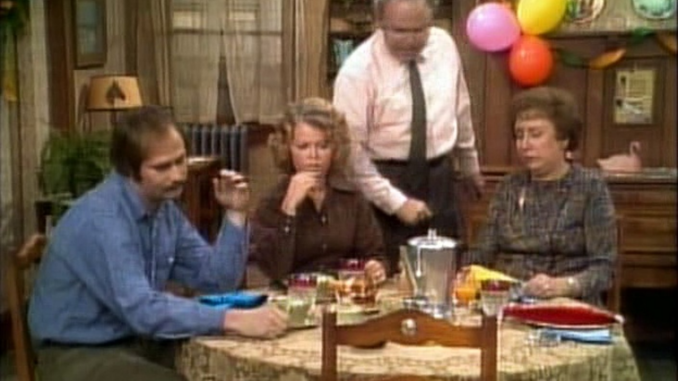
Introduction: The Family That Redefined Television
When All in the Family first aired in 1971, it introduced us to a cast of characters unlike any other family on TV. The Bunkers were loud, flawed, and often infuriating—but they were also deeply human, relatable, and, at times, endearing. From the gruff, politically incorrect Archie to the sweet, long-suffering Edith, each character in the Bunker family brought something unique to the table. Over the years, these characters became cultural icons, and their relationships formed the backbone of one of the most groundbreaking sitcoms in television history.
Archie Bunker: The Bigoted Patriarch We Loved to Hate
At the center of All in the Family was Archie Bunker, the quintessential working-class man whose outdated views and blatant bigotry made him both infuriating and oddly lovable. Played brilliantly by Carroll O’Connor, Archie was a man who saw the world in black-and-white terms, with little tolerance for the changing cultural landscape of the 1970s. His catchphrases—“Meathead” (for his son-in-law Mike) and “dingbat” (for his wife Edith)—became iconic, as did his politically incorrect rants about race, gender, and social issues.
Yet, despite his flaws, Archie wasn’t just a caricature of a bigot. O’Connor’s portrayal of Archie added layers of complexity to the character. He was a man trapped in his own prejudices, struggling to understand a world that was changing too fast for him to keep up. And in some of the show’s most poignant moments, viewers saw that beneath the surface, Archie’s heart was not as hard as he would have liked to believe.
Edith Bunker: The Heart and Soul of the Family
While Archie was the star of the show, Edith Bunker (played by Jean Stapleton) was its emotional core. As Archie’s devoted wife, Edith was the epitome of kindness and patience. Often portrayed as a “dingbat” in her husband’s eyes, Edith was far more intelligent and compassionate than she was given credit for. Her unwavering support for her family, her optimism, and her ability to see the good in people made her a beloved character. Edith’s character also broke new ground in television by showing the depth of a woman’s inner strength, even if she was often overshadowed by the dominant personalities around her.
Mike and Gloria Stivic: The Progressive Young Couple
In sharp contrast to Archie and Edith, Mike “Meathead” Stivic (played by Rob Reiner) and his wife Gloria (Sally Struthers) were the show’s progressive voices. Mike’s liberal views often put him at odds with Archie, resulting in some of the show’s most memorable—and sometimes tense—debates. Mike represented the younger generation, questioning the old ways of thinking and challenging Archie’s narrow view of the world. Gloria, on the other hand, was both the voice of reason and the conduit between the two conflicting generations. Her role as the bridge between her conservative father and her liberal husband reflected the generational divide that was a central theme of the show.
The Family Dynamic: Comedy That Taught Us About Ourselves
What made the Bunker family so unique was their ability to represent the complex dynamics of a real family. They weren’t perfect, and they didn’t always get along—but they loved each other. The show tackled difficult subjects like racism, sexism, and generational conflict, but it did so through the lens of family life. The Bunkers weren’t just sitcom characters—they were real people, with flaws, hopes, and dreams. The beauty of the show was that, despite their differences, the Bunkers always found a way to come together, whether in moments of joy or in the face of deep personal conflict.
Conclusion: A Family We’ll Never Forget
The Bunkers will always be remembered as one of the most iconic families in television history. All in the Family may have pushed the boundaries of comedy, but it also showed us that family isn’t about perfection—it’s about accepting each other’s flaws and learning to grow together. Through the Bunkers, we laughed, cried, and learned valuable lessons about love, tolerance, and the importance of understanding each other, no matter how different we may seem.
